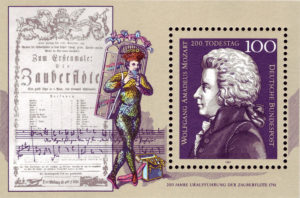A stranger approached Wolfgang Amadeus Mozart in July 1791. He wanted Mozart to write a Requiem for a patron and to finish it as quickly as possible. Mozart never finished it. On December 5, he died. Some people think he was poisoned.
The patron was named Count Franz von Walsegg. The Count wanted to pass off Mozart’s work as his own, in memory of his recently deceased wife. In other words, he hired one of the greatest composers in history as a ghostwriter of music. Mozart’s students, Franz Xaver Süssmayr and Joseph Eybler, finished the work. Walsegg made a partial payment to Mozart; it isn’t clear whether he paid for the completion. The condition of secrecy had been thoroughly ruined by that point. 
Update: According to several sources, Walsegg received the Requiem with the posthumous completions and performed it as his own work on December 14, 1793. Mozart’s widow, Constanze, violated the confidentiality agreement by having the work publicly performed as Mozart’s.
We can say this much for Walsegg: When it came to honoring his wife, he went to the best. He’d previously commissioned works by other composers and put his own name on them. Just hearing the Requiem would undoubtedly have put an end to any thoughts that it was his work, and musicologists would probably have quickly zeroed in on Mozart.
The composers of Vienna, including Haydn and Mozart, had written settings of the Mass whose scale seems more appropriate to the concert hall than the church. This was the first time any of them had done the same with the Requiem text. It was undoubtedly more than Walsegg expected.
What can we say about Mozart’s role in this? Mozart — Mozart?? — accepting a commission as a ghostwriter? Well, we can say he needed the money. He wasn’t in great shape financially. We can also say that he gave it nothing but his best, even though he didn’t expect his name to be on it. The work is a masterpiece, even in its unfinished form. Musical experts say that Süssmayr and Eybler did some of the best work of their lives completing it. They finished incomplete sections, set out the instrumentation where Mozart didn’t indicate it, and sometimes wrote entirely new music. For the closing section they reused the powerful “Kyrie” with different words.
Ghostwriters for a ghostwriter who was now a ghost. All of them gave their very best, even though they weren’t likely to get credit for it. Was Mozart even capable of writing bad music? When he tried, in “A Musical Joke,” it was some of the best bad music ever written.
If you’re a writer, there’s no such thing as writing “just” for money. The ones who write for money aren’t writers but hacks. Their work might be grammatical and hit all the SEO requirements, but there’s no sense of pride in their work. An AI will soon be able to replace them.
Whether you’re a writer or a hack doesn’t depend on what market you write for, how much you get paid, or whether you get credit, but in your attitude to your work. You may not be a Mozart or a Shakespeare, but if it’s your unbreakable instinct to put your best into whatever you create, you’re a writer.